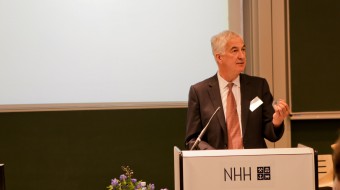Nyhet! Vi har lansert ny nettside. Del gjerne feedback enten på epost eller på Jodel.
 Annonsere?
Annonsere?
Nyhet! Vi har lansert ny nettside. Del gjerne feedback enten på epost eller på Jodel.
 Annonsere?
Annonsere?

Much like previous years, this year’s Spring Conference sought to bring together professionals and representatives from different fields including politics, business, and academia both from within Norway and abroad. Their aim: to discuss Norway’s tripartite economy.
Following tradition
“The Spring conference has a great significance for NHH, and we sincerely hope it means a great deal to you too”, said Rektor Jan. I. Haaland when he opened the conference. The Spring Conference has been an annual tradition at NHH since 1995. Each year, leading professionals and key figures from the fields of research, politics, and the private and public sectors gather at NHH to discuss topics relevant for the future. The guest list was extensive, including the likes of Oxford Professor Anthony J. Venables, Tom Colbjørnsen Rektor at BI and Svein Skeie, Senior Vice President at Statoil.
The theme - from a dual to a tripartite economy
Norway is often described as a dual economy comprising the oil sector and the mainland economy. This conference discussed the possibility of a tripartite economy instead, as both the public sector and petroleum sector influence the rest of the business world.
Some of the questions that the conference tried to shed some light on included: Should a country save or exhaust its oil revenues? Is there a reason why the presence of women as top leaders in our economy has been minimal? Given that Norway will run out of oil at some point, will the current dichotomy between petroleum-related and other competitive businesses create problems for the changes that must come to all parts of the Norwegian economy?
These heavy questions with many answers were met with a good dose of healthy discussions, opinions, and sharing of experiences from the audience.
The mixed blessings of abundance
Professor Anthony J. Venables delved into the topic of economies that are resource rich, concentrating mainly on countries in Africa. “Managing natural resources is a weakest link problem,” he said. There are many steps to be considered, ranging from the very basics of exploration and development, regulation of the sector, implementation of fiscal regimes and finally how to make smart decisions about savings and spending decisions. As he aptly explained, “there are so many underlying steps from extracting the resource to selling it – get one of them wrong and then you’ve blown it.”
He also pointed out that while resource abundance is usually associated with low GDP growth, this may not necessarily be the case; for every Nigeria, there is a Norway, Chile or Botswana. “We should learn from the success stories of Norway and Chile,” concluded Mr. Venables.
Are women less competitive than men?
Another relevant topic in the conference was an experiment performed by Choice Lab at NHH which explored reasons for the minimal presence of women in leadership positions. Are women more risk averse than men?
“What we need to do is discriminate against women in the job market; that way they will go open their own companies,” said Bertil Tungodden a professor from NHH jokingly after he opened his lecture with some shocking facts. “6 out of 206 women are in top leadership positions in Norway. 1 in 4 entrepreneurs are women. This lack of women in our economy leads to efficiency losses,” he said.
He revealed some very astounding results from his paper. “Willingness to Compete” --75% of men chose to compete, while only 25% of the women wanted to compete in a situation where there is no discrimination what so ever. Plausible explanatory factors are income and social status. Males from high-income families are even more likely to take risk than women of comparative status.